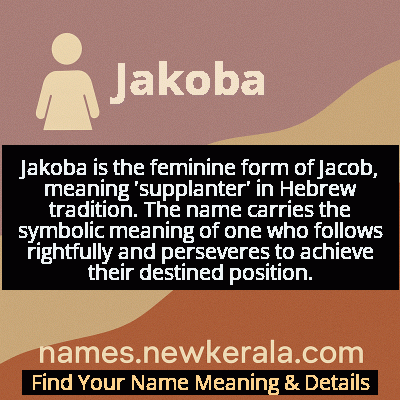Jakoba Name Meaning & Details
Origin, Popularity, Numerology Analysis & Name Meaning of Jakoba
Discover the origin, meaning, and cultural significance of the name JAKOBA. Delve into its historical roots and explore the lasting impact it has had on communities and traditions.
Name
Jakoba
Gender
Female
Origin
Hebrew
Lucky Number
4
Meaning of the Name - Jakoba
Jakoba is the feminine form of Jacob, meaning 'supplanter' in Hebrew tradition. The name carries the symbolic meaning of one who follows rightfully and perseveres to achieve their destined position.
Jakoba - Complete Numerology Analysis
Your Numerology Number
Based on Pythagorean Numerology System
Ruling Planet
Uranus (Rahu)
Positive Nature
Strong sense of order, loyal, practical, and disciplined.
Negative Traits
Stubborn, overly serious, rigid, and prone to feeling restricted.
Lucky Colours
Blue, gray.
Lucky Days
Saturday.
Lucky Stones
Blue sapphire.
Harmony Numbers
1, 7, 8.
Best Suited Professions
Managers, engineers, accountants, organizers.
What People Like About You
Dependability, discipline, practicality.
Famous People Named Jakoba
Jakoba Mulder
Urban Planner
Key figure in Amsterdam's urban development and creator of the Amsterdam Forest
Jakoba van Heemskerck
Painter
Dutch modernist painter and stained glass artist associated with the Expressionist movement
Jakoba de Jonge
Nobility
Dutch noblewoman known for her political influence during the Dutch Golden Age
Name Variations & International Equivalents
Click on blue names to explore their detailed meanings. Gray names with will be available soon.
Cultural & Historical Significance
In modern contexts, Jakoba maintains its cultural resonance as a name that honors both religious heritage and European cultural identity. It represents a connection to ancestral traditions while embodying feminine strength and leadership. The name's continued, though infrequent, usage demonstrates how traditional names can preserve cultural memory and family lineage across generations. Jakoba serves as a cultural touchstone that links contemporary naming practices with rich historical narratives and religious symbolism.
Extended Personality Analysis
Women named Jakoba are often perceived as strong-willed, determined individuals with a natural leadership quality. The name's meaning of 'supplanter' suggests someone who is strategic and persistent, able to overcome obstacles through careful planning and resilience. They tend to be practical problem-solvers who approach challenges with both creativity and methodical thinking. Jakobas are typically seen as grounded individuals with a strong sense of tradition and family values, yet they possess the adaptability to navigate changing circumstances effectively.
Their combination of strength and sensitivity often makes them natural mediators and trusted advisors in both personal and professional contexts. While they can be assertive when necessary, they generally lead with empathy and a deep understanding of human nature. Jakobas are often described as having an inner fortitude that allows them to weather difficulties while maintaining their core values. They tend to be loyal friends and dedicated family members who build strong, lasting relationships based on mutual respect and trust. The name suggests a personality that balances ambition with compassion, creating individuals who achieve their goals without sacrificing their humanity.
Modern Usage & Popularity
In contemporary times, Jakoba remains a relatively uncommon but respected name, primarily used in Dutch-speaking regions and among families with strong biblical or European heritage connections. The name has maintained a steady but low frequency of use, often chosen by parents seeking a traditional yet distinctive feminine name with historical depth. While not appearing on most popular baby name charts, it enjoys periodic revivals when vintage and biblical names cycle back into fashion. Modern usage tends to be concentrated in the Netherlands, Belgium, and among Dutch diaspora communities worldwide, with occasional adoption by parents in other countries looking for unique biblical names with European flair. The name's rarity in the 21st century gives it an exclusive quality while maintaining its traditional roots.
Symbolic & Spiritual Meanings
Symbolically, Jakoba represents transformation through perseverance and the idea of rightful succession. The 'supplanter' meaning carries connotations of strategic advancement and the fulfillment of destiny through determined effort. The name symbolizes the balance between tradition and progress, honoring heritage while moving forward. It also embodies the concept of divine blessing and covenant, reflecting the biblical Jacob's relationship with God. The feminine form adds layers of nurturing strength and the idea of building foundations for future generations. Symbolically, Jakoba suggests someone who bridges worlds – connecting past and future, tradition and innovation, strength and compassion in a harmonious balance that enables meaningful impact and lasting legacy.

